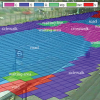187 search results - page 18 / 38 » A Markov Random Field Model for Automatic Speech Recognition |
ICASSP
2009
IEEE
13 years 5 months ago
2009
IEEE
This paper applies two dynamic Bayes networks that include theoretical and measured kinematic features of the vocal tract, respectively, to the task of labeling phoneme sequences ...
FGR
2006
IEEE
14 years 1 months ago
2006
IEEE
We present a novel tracking algorithm that uses dynamic programming to determine the path of target objects and that is able to track an arbitrary number of different objects. The...
ECCV
2010
Springer
13 years 11 months ago
2010
Springer
Advanced surveillance systems for behavior recognition in outdoor traffic scenes depend strongly on the particular configuration of the scenario. Scene-independent trajectory analy...
LREC
2008
13 years 9 months ago
2008
Speech synthesis by unit selection requires the segmentation of a large single speaker high quality recording. Automatic speech recognition techniques, e.g. Hidden Markov Models (...
ICML
2009
IEEE
14 years 8 months ago
2009
IEEE
In this paper, we investigate a simple, mistakedriven learning algorithm for discriminative training of continuous density hidden Markov models (CD-HMMs). Most CD-HMMs for automat...

